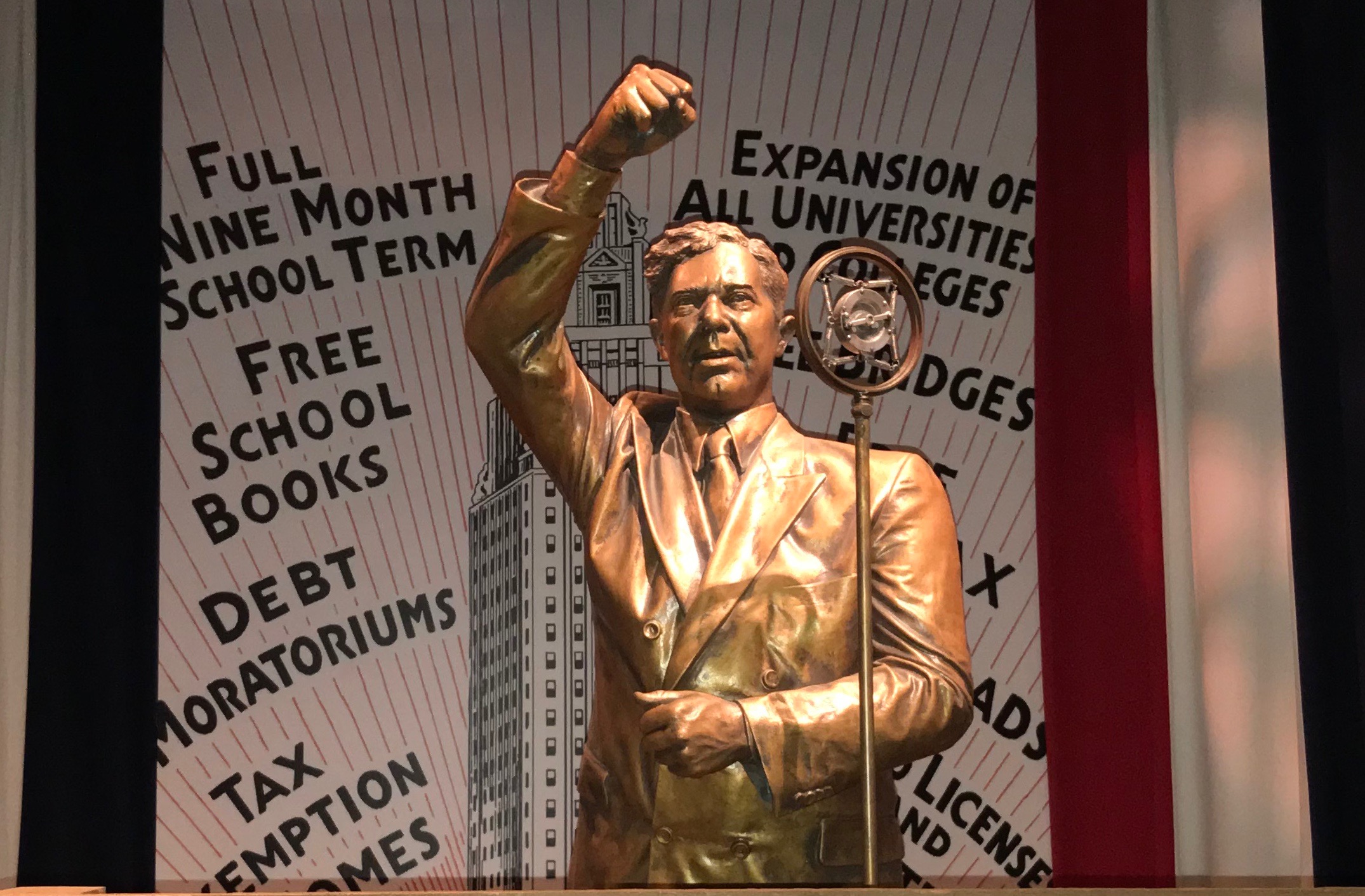Time of the Kingfish
By Rick Holmes
Feb. 23, 2018
Baton Rouge, La. – Populism in America isn’t what it used to be. What we now call populists – Donald Trump and Bernie Sanders, for example – evoke the style of populists of old, but their policies pale by comparison.
Huey P. Long was a real populist. He was colorful and charismatic, known for plain talk and country wit. He enjoyed picking fights, and when someone came after him he responded with both barrels. Long was the sworn enemy of elite bankers and large corporations. He was the champion of the poor in a state that had plenty of poor.
But Long had a progressive program to match his bombast, and a record of bringing radical change to a state in dire need of it.
When Long became governor in 1928, “Louisiana ranked at the bottom of every measure of social and economic progress,” according to a display just steps away from the office in the Old State Capitol where Long worked. After he left it was never the same.
“I’m for the poor man – all poor men, black and white,” he said, “they all gotta have a chance.”
As governor, Long got the poll tax repealed, and a quarter million poor Louisianans voted for the first time. He provided free textbooks and free busing, and school enrollment grew by 20 percent. He quintupled enrollment at Louisiana State University, beefed up its faculty, and even wrote songs for its marching band.
Long didn’t just talk about income inequality, he embraced redistribution. The platform he advocated as he prepared to run for president was titled “Share the Wealth.” It called for a $50 million cap on all private fortunes, a $2,000 minimum family income guarantee, a 30-hour work week, old age pensions, free college, free health care and four weeks’ vacation for everybody.
Long was a builder. At one point one-tenth of America’s highway workers were building roads and bridges in Louisiana. In the midst of the Great Depression, he built a new, 34-story, State Capitol – still the nation’s tallest – that towers over Baton Rouge.
Long, nicknamed the Kingfish, built a powerful political machine and used it ruthlessly. He was branded a demagogue, a fascist, a scoundrel. Franklin Roosevelt, who Long had planned to challenge in 1936, called him “one of the two most dangerous men in America” (the other was Gen. Douglas MacArthur). Long made many friends and plenty of enemies. When he proposed a tax on oil processing, the state’s powerful oil lobby tried to get him impeached.
In 1935, one of his enemies finally caught up with him in a hallway in the new State Capitol he’d built. The son of a state judge Long had forced out of office confronted Long and both fell dead in a hail of bullets, most of them fired by Long’s bodyguards. There’s still controversy over which gun actually killed the Kingfish, but there’s still controversy about much of Long’s life.
Long’s political machine outlived him, but not his populist vision for Louisiana. Huey’s skyscraper statehouse has seen plenty of colorful characters and sleazy scandals in the decades since, but none of them did as much to help the state’s poor as he did.
Over the last few decades, Louisiana has been reliably Republican in national races, its legislature more corporate than populist. What populist anger you hear today is directed at Washington and the cultural elite, not at banks, corporations or the corporations’ friends in Baton Rouge.
Those friends have included Bobby Jindal, who served eight years as governor. Jindal and the GOP-led Legislature cut taxes, doubled corporate tax credits and exempted the oil and gas industry from lawsuits over environmental destruction. But rather than leaving the state in better shape, Jindal left it with a huge budget deficit.
The big picture is that 90 years after Huey Long became governor, Louisiana still trails the nation in most rankings of social and economic well-being. Poverty is high and education rates are low. U.S. News and World Report ranked it last in the nation based on metrics in seven areas. It ranked in the bottom five in crime, opportunity, economy, education and government. It leads the nation only in dependence on the federal government, which covers 42 percent of the state budget.
Don’t get me wrong: Louisiana is a fine state, with great people, beautiful places and a rich, diverse culture. Y’all ought to visit. But something’s not working in Louisiana’s government, and it hasn’t worked since the day Huey Long was gunned down in the nation’s tallest state capitol.
Rick Holmes can be reached at rick@rickholmes.net. You can follow his journey at www.rickholmes.net. Like him on Facebook at Holmes & Co, on follow him on Twitter @HolmesAndCo.

